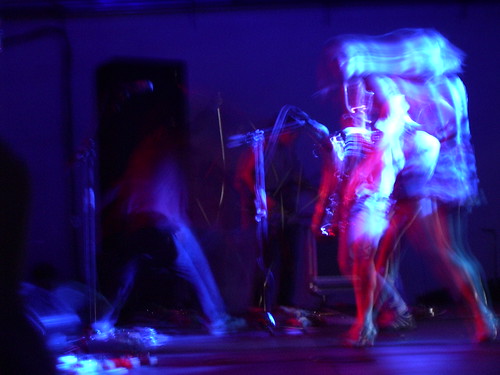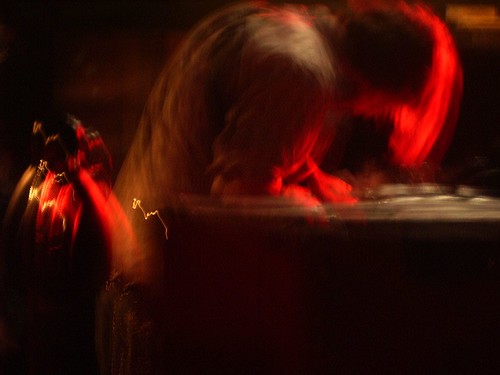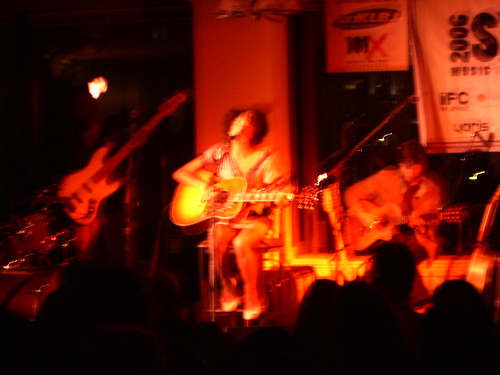
[This piece was written for the cover of Mojo in June 2005, and was about the greatest week of my life, certainly the biggest piece I've ever sunk my teeth into. Tackling The White Stripes was such a big deal for me - I wrote the first pieces on the band for NME in 2001, having caught them with Steve Gullick at SXSW that April, following the discovery of their Die Stihl album earlier that year. After Steve and I snuck a picture review of this obscure Detroit duo into the paper's coverage of that year's festival, NME ran the album review of Die Stihl they'd had stuck on a spike since February; as industry buzz on the duo built, I got to review their London show at 100 Club, because the NME live editor who'd taken the assignment for himself had gotten too drunk at the show, and asked me to turn 600 words around for 10am the next morning instead.
I'm really glad I did. The review, a blur of breathless grandstanding for The Stripes, got read aloud on air as part of a Radio 4 piece on the group's whirlwind debut tour in the UK, and reprinted in a number of mainstream papers' pieces on the group, while Neil McCormick interviewed and wildly misquoted me in the Telegraph's hatchet job on the group. It was, however, the last I would write on the White Stripes for NME; as they ascended in fame, more established writers stepped in, and the paper's relationship with the group dissolved. I got to interview Jack, via the telephone, for a piece The Evening Standard ran before NME's first interview with the group, largely because Alex Hannaford, one of the paper's pop writers and a great friend, had crashed at my motel through SXSW and saw first hand how excited Gullick and myself were over the group.
But that would be my only interview. By the time I quit NME, at the start of 2002, NME certainly wouldn't have comissioned me to write on The Stripes. I moved onto Kerrang! and Mojo, writing reviews and thinkpieces on the group, but resigned to never getting to interview them.
Then a funny thing happened... Some time after the Jack/Jason Stollsteimer duff-up of 2003 (?) - which, to anyone who'd ever met Jason, had obviously been a long time coming, given Stollsteimer was badmouthing Jack every chance he got - i wrote a non-interview piece on Jack for Kerrang!, with invaluable assistance from Jack's nephew Ben of The Dirtbombs (a fine, fine writer, by the way), that put forth the argument that Jack, for some reason, and perhaps wisely, was unwilling to express in his own words: that Jason had been provoking White for some time, and that the fight wasn't some vicious outburst from Jack, but the result of several years of friction between the two, and the disrespect from Jason who, in my opinion, owed his career to the media attention Jack's patronage offered (which is not to say Stollsteimer wasn't a gifted singer and songwriter, at least for the duration of The Von Bondies' first album).
The upshot was that Jack had apparently liked the piece, and, through a serious of cool coincidences and absolute golden luck, I got the comission to write the Mojo piece (which I still can't quite believe). The experience of shadowing the band across Brazil - a wonderful, wonderful country - was unforgettable, and I've only been able to cram some of it into the following piece, which is the uncut and expanded first draft of the piece. Getting to take this trip of a lifetime, and to be able to write at length, in perhaps the world's most respected rock magazine, more than made up for not getting to write any features on the band for NME.
The word count was 7000, a length I baulked at before leaving for Manaus, but which seemed puny by the time I'd returned, just because of how much I'd seen and experienced out there, all the momentous happenings we'd chanced upon. Phil Alexander and myself worked right up to the wire to get the piece just right, kudos to him. This cut is about a thousand words, so I'm going to chop it up into pieces for easy digestion!
Special thanks due to Colleen Moloney (the group's awesome PR, GBV fan and Argentian steak enthusiast), Ewen Spencer (Mojo photographer, Posies fan and ace card player), John Baker, Ian Montone, the Stripes' crew, Phil Rodriguez, and The White Stripes themselves. Pictures are the author's own...]
Manaus Boat Trip
The prone reptile is lulled safely to sleep by the guide who, moments ago, dived into the inky waters of the Ponte Negra river to capture it. A baby caiman crocodile, it measures less than two feet long, though we are reliably informed they can easily grow up to ten feet. Like the snakes, the mosquitoes, the schools of ravenous piranha clouding the waters, it is just one of the predators we were warned of as we embarked upon this boat trip.
The caiman gets its belly gingerly tickled by all the Stripes’ road crew, a ten-person team whose familial relationship with the band is confirmed by their presence on such private, ‘day-off’ excursions. It’s passed around the boat, to the members of the band’s larger entourage, along for this momentous portion of the White Stripes’ first South American tour, to manager Ian Montone, to booking agent Russell Warby, to Phil Rodriguez (promoter of the Brazilian shows), to Meg White, who grabs hearty hold of the reptile, and to Karen Elson, international supermodel and Jack’s sweetheart. Finally, the crocodile makes its way to Jack, tucked at the vessel‘s nose, sporting a pink gingham shirt, straggly bandito beard and wild, wiry hair.
“Jack doesn’t want to hold the alligator,” grins Jim Vincent, The White Stripes’ guitar tech, “He wants to kill it and stuff it.”
The excursion began earlier that Tuesday afternoon, a fine way to kick off five nights touring across Brazil, as part of their South American tour, the first in support of Get Behind Me Satan. The following night, the band will play the legendary Teatro Amazonas, an 600 capacity opera house in Manaus, a city nuzzled in the nape of the rainforest, the grandest venue the Stripes have ever played, and also the smallest audience they‘ve performed to in some time.
For 90 minutes our boat chopped the waters into a fizzy cola-coloured frenzy, speeding bumpily up the Ponte Negra, past trees growing twenty feet beneath the water’s surface (this is rainy season; in dry periods this ‘river’ is a valley many feet deep), fearsome birds circling overhead. Members of an accompanying MTV film crew, here to shoot the Teatro Amazonas gig for later broadcast, shoot ‘background’ footage from the side of the boat. The surrounding scenery does not disappoint, the grandness of this natural beauty, the profound peacefulness of the ancient rainforests, affecting us diesel-breathing city kids.
Soon, however, our boat puttered to an unscheduled stop at Ariau Amazon Towers, a surreal ‘hotel’ built at treetop-level in the Rainforest, composed of catwalks and jetties and dining rooms fashioned from tropical woods (with mobile phone charge-points drilled into the ancient timbers). As we docked, a scantily clad local girl dancing to tribal rhythms beaten out behind her draped hand-fashioned garlands about our necks. We negotiated our way to the dining hall, spotted with stuffed alligators and tanks full of piranha, silently reeling at the accumulating sense of surreality. It soon transpired that this unexpected detour was the work of Phil Rodriguez, the Miami-based promoter for the Brazilian shows, and a veteran of the Rock In Rio festivals, a decidedly old-school rock’n’roll character who relishes his work with a showman’s flair, sporting a pendant of a razor blade with a crucifix inside it. It also soon transpired that this detour was only the beginning of a much more involved excursion than had been planned.
With night already drawing in and the skies melting into red as we set off, the boats crackled with nervous, excited chatter of Joseph Conrad’s ‘Heart Of Darkness’, a bleak tale of madness and awful destiny in the jungle. But all that awaits us on this journey is the odd gargantuan dragonfly, the mesmerising treescapes of the rainforest cut against the striking Amazonian skies and reflecting off of the opaque Ponte Negra, and a short visit of some local indigenous people’s living spaces, bereft of electricity, where they live off the berries they pick and the flour they mill. And as the boats cut their engines, and we drifted softly in the silent waters, with only a ceiling of stars for light, fireflies and magic sparking in the darkness, a calm - rare in the White Stripes’ world nowadays - fell upon the party.
Holding the helpless croc in his hands, Jack says it’s time to let it back into the river. The guide tickles the caiman awake again, and it wriggles from her grip, back into the water. We’re not going to meet Jack White, Alligator Hunter or Celebrity Taxidermist, tonight, and he’s not about to live out the lyrics of the Stripes song ’I Fought Piranhas’. It is very quickly apparent, however, that the band’s sojourn in Brazil will be anything but uneventful; before the week is out, Jack White will have started a riot, married a supermodel at the mouth of the Amazon, and played the most challenging, most electrifying shows of his career, for which Mojo will score you only the best seats.
Not bad work for a man who started the year ready to give up on everything The White Stripes had worked for, and whose latest album, the twisted and brilliant Get Behind Me Satan, suffered the most traumatic, cathartic gestation of any Stripes release to date.
The last time I interviewed Jack White it was early in 2001, for the London Evening Standard, his first interview with a UK daily paper. We were talking specifically about Sympathetic Sounds Of Detroit, the compilation he’d recorded, showcasing Detroit’s coterie of homegrown garage-rock talent, and latterly bringing the sweat-beaded party music of groups like The Dirtbombs, the Detroit Cobras and The Von Bondies to a world audience, following The White Stripes’ own meteoric rise later that year. White Blood Cells, The Stripes’ third album and the one that catapulted them from a garage-rock cult to the phenomenon they swiftly became, had yet to hit the shelves, but one lyric on the pre-release promo was particularly intriguing.
‘Little Room’, in its elliptical way, seemed presciently aware of the challenge that would face a humble little band like The White Stripes, should fame come knocking.
“When you’re in your little room / And you’re working on something good / But if it’s really good / You’re gonna need a bigger room,” hollered Jack, warning, “When you’re in your bigger room / You might not know what to do / You might get to wondering how you got started, sitting in your little room”
Aware of the growing industry fascination with the oddball blues-punk duo, but with not an inkling of the media-wide Stripes-mania that would greet their first tour of England in June 2001, I asked Jack whether he thought great success might sour The White Stripes. “We’d never change what we’re doing, we’d never let it affect us like that,” he replied, adding, dismissively, “But we’ll never have that kind of attention. A band like ours would never make it onto MTV.”
Four years and two albums later, and the White Stripes’ unlikely interim success has made a lie of at least some of Jack’s words. While sales-wise they don’t quite trouble commercial behemoths like 50 Cent or Green Day (“Everyone‘s adopted our red black and white colour scheme,” snorts Jack, later, “Green Day, My Chemical Romance, everyone…”), they’re certainly highly visible, thanks to appearances on the covers of magazines and last year’s Grammy Awards, and to Jack’s extra-curricular activities, from recording Loretta Lynn’s recent Van Lear Rose album, to his relationship with Hollywood actress Renee Zellwegger, and his high-profile punch-up with Jason Stollsteimer, singer/guitarist of Detroit band The Von Bondies. And while their Get Behind Me Satan set might seem unlikely to beat the initial sales of the new Coldplay and Oasis albums released on the same date, the latest issue of Rolling Stone, still somewhat influential among music listeners in the US, has given the record a four and a half star review, in sharp contrast to the lukewarm reception afforded the aforementioned acts.
Certainly, their decision to begin touring duties for Get Behind Me Satan in South America, playing countries rock’n’roll groups rarely visit, suggests Jack’s wilful ambition, a desire to play outside the comfort zone, outside their ‘Little Room’.
“We asked our agent to find us some places nobody plays,” offers Jack later, backstage at the grand Teatro Amazonas. “We planned a tour of them, probably the first tour we’ve not made money on, even with our small crew. It doesn’t matter. This is the best tour we’ve ever done.”
The Stripes played Rio once before, in October 2003, for the TIM music festival, sharing the bill with Public Enemy, Peaches and jazz legend Illinois Jacquet. They were in town for one day , the highlight of which was meeting Flavor Flav in the hotel elevator.
“It was Hallowe’en,” grins the excitable Jack, backstage at the grand Teatro Amazonas on Wednesday afternoon, hours before they take the stage. “He asked us what we’d been doing, and we said we’d been to see the art deco Christ, up near Sugar Loaf mountain. And he said, ‘Yeahhh Boyeee, I gotta do that, cuz that’s a famous mountain!’ [laughs] It was a great moment. He didn’t know me from Adam.”
The South American tour began on May 11th, at the Fundidora Amphitheatre de Coca Cola in Monterrey, Mexico, and ends with the Sao Paolo show on June 4th, taking in Guatemala, Panama, Colombia, Chile and Argentina. Jack’s favourite moment so far has been the gig in Panama, where almost nobody clapped as they walked onstage. “It felt like we were the opening band,” he laughs, eyes agape, Meg White grinning demurely in agreement across from him, the band’s appropriately red, white and black touring wardrobes cramped around her in the tiny dressing room. “It was like a challenge. Dustin Hoffman said something recently, that a lot of his motivation as a struggling actor was a sense of proving wrong the people who thought he couldn’t pull a performance off, kind of ‘I’ll show you!’. It’s a good motivation, like walking out in front of an audience hipsters with their arms crossed: when you win them over in the end, it’s the greatest feeling in the world, like winning the toughest chess match.”
Not all of South America has received The White Stripes so coolly, however. Jack and Meg, with Jack’s supermodel girlfriend Karen Elson in tow, were greeted by the flashbulbs of the paparazzi upon their arrival at Manaus airport, and photographers slyly wander about the Tropical Resort hotel where the band are staying. Indeed, in the lobby shortly before our boat trip, a snapper dressed as hotel cleaning staff fires a flashbulb directly in Jack’s face, with no warning. Unthreateningly, but with authority, the six foot-plus White ushers the elfin photographer away, saying “Okay, you have to go now…”. In this moment, he seems more the harassed Gentleman of his lyric book, than the fist-friendly troublemaker his episode with Stollsteimer suggested.
The press are much more respectful at the official Press Conference for the following day’s Teatro Amazones show. A hotel conference room swarms and writhes with cables and flashbulbs, journalists with notepads and dictaphones, cameramen teetering in for a closer shot of the duo, a collected, professional chaos. Sat behind a table cluttered with microphones, Jack fills Meg’s glass with water between answering the press’s painstakingly-translated questions, shooting her conspiratorial grins, like, ‘Can you believe we’re getting away with this?’ Out of place, and silently, respectfully bemused at the tumult around them, they have the outsiders’ rapport of desperadoes, of a Butch and Sundance. They seem grateful, however, that the journalists avoid asking the more obvious, well-trodden topics, like whether Jack and Meg are really brother and sister, or questions about Jack’s private life.
Journalist 1: “The new album is being released less than three months after it was recorded… Why so fast?”
Jack: “The longer you take working on something, the more likely you are to ruin it. That‘s how you end up with ‘fake’ music, music for 12 year olds, which is, unfortunately, very popular in the US today.”
Journalist 2: “Meg, was it your idea to sing on the new album?”
Meg: [shyly] “Um, Jack wrote the song and gave it to me to sing. Which I thought was great, because I love singing.” [Meg, with typical politeness, doesn’t point out that she also sang ‘Cold Cold Night’ on 2003’s Elephant]
Journalist 3: “What is the meaning behind choosing Get Behind Me Satan as an album title?”
Jack: “I chose it because it’s my favourite thing that Jesus ever said…”
Journalist 4: “Are you excited to be playing at such an historic venue?”
“Most definitely,” replies Jack, sincerely. He then adds, impishly, “I hope we’re not too loud and no plaster falls from the ceiling.”
Fabiana, the band’s translator for this trip, wisely chooses not to translate the last chunk of this reply into Portuguese for the attendant Brazilian journalists.




No comments:
Post a Comment